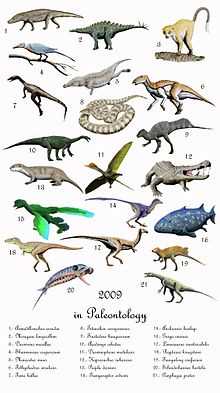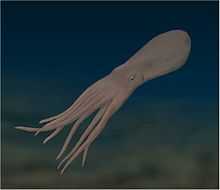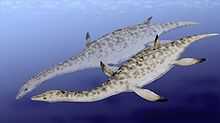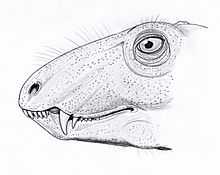2009 in paleontology
| List of years in paleontology |
|---|
| ... 1999 . 2000 . 2001 . 2002 . 2003 . 2004 . 2005 ... 2006 2007 2008 -2009- 2010 2011 2012 ... 2013 . 2014 . 2015 . 2016 . 2017 . 2018 . 2019 ... In science: 2006 2007 2008 -2009- 2010 2011 2012 |
| Art . Archaeology . Architecture . Literature . Music . Philosophy . Science +... |
| Wikimedia Commons has media related to 2009 in paleontology. |

Paleontology, palaeontology or palæontology (from Greek: paleo, "ancient"; ontos, "being"; and logos, "knowledge") is the study of prehistoric life forms on Earth through the examination of plant and animal fossils.[1] This includes the study of body fossils, tracks (ichnites), burrows, cast-off parts, fossilised feces (coprolites), palynomorphs and chemical residues. Because mankind has encountered fossils for millennia, paleontology has a long history both before and after becoming formalized as a science. This article records significant discoveries and events related to paleontology that occurred or were published in the year 2009.
Arthropods
Cephalopods
Three new species of extinct Octopoda discovered in 2009. The species – Keuppia hyperbolaris, Keuppia levante, and Styletoctopus annae – lived about 95 million years ago, and bear a strong resemblance to modern octopuses, suggesting that the Octopoda order has remained relatively unchanged for tens of millions of years. The fossils included evidence of arms, muscles, rows of suckers, ink, and internal gills. The discovery was made by a team led by Dirk Fuchs of the Freie University, which is located at Berlin, Germany.[2] The fossils were found at Hakel and Hadjoula, Lebanon.[3] Various new ammonoid taxa were named, including Ivoites.
| Name | Novelty | Status | Authors | Age | Unit | Location | Notes | Images |
|---|---|---|---|---|---|---|---|---|
|
Gen et sp nov |
Valid |
Fuchs, Bracchi, & Weis |
Upper Cenomanian |
 Keuppia levante | ||||
|
gen et sp nov |
Valid |
Fuchs, Bracchi, & Weis |
Upper Cenomanian |
|||||
|
Ivoites[5] |
gen nov |
Valid |
De Baets, Klug, & Korn |
Lower Emsian |
||||
Amphibians
Newly named amphibians
| Name | Status | Authors | Age | Unit | Location | Notes | Images |
|---|---|---|---|---|---|---|---|
|
Valid |
|
Lower Cretaceous |
Possible stem neobatrachian |
||||
|
Valid |
|
Lower Cretaceous |
A hyloid | ||||
|
Valid |
|
Early Permian |
The smallest known ostodolepid microsaur | ||||
|
Valid |
|
Turonian |
|||||
|
Valid |
|
Early Cretaceous |
A cryptobranchoid salamander | ||||
|
Valid |
|
Early Permian |
|||||
Anapsids
Newly named anapsids
| Name | Status | Authors | Discovery year | Age | Unit | Location | Notes | Images |
|---|---|---|---|---|---|---|---|---|
|
Valid |
|
Turonian (Late Cretaceous) |
||||||
|
Valid |
|
Late Cretaceous |
||||||
|
Valid |
|
Middle Permian |
A basal parareptile | |||||
|
Valid |
|
Late Jurassic/Lower Cretaceous |
||||||
|
Valid |
|
Paleocene |
|
New genus for "Plesiobaena" putorius Gaffney, 1972 | ||||
|
Derrisemys[16] |
Junior synonym |
|
Early Paleocene |
|
Junior synonym of Hutchemys.[17] | |||
|
Valid |
|
Middle Jurassic |
||||||
|
Valid |
|
Paleocene |
|
A plastomenine softshell turtles | ||||
|
Valid |
Late Cretaceous |
|||||||
|
Valid |
|
Maastrichtian |
|
A baenid | ||||
|
Valid |
|
Late Cretaceous |
|
A baenid | ||||
|
Plastomenoides[16] |
Junior synonym |
|
Early Paleocene |
|
Junior synonym of Hutchemys.[17] | |||
|
Valid |
|
early Late Olenekian |
Czatkowice 1 |
A procolophonine procolophonid | ||||
Bony fish
| Newly named Tetrapodomoprhs | |||||||
|---|---|---|---|---|---|---|---|
| Name | Status | Authors | Age | Unit | Location | Notes | Images |
| Heddleichthys[23] |
Valid |
|
Famennian (Late Devonian) |
Dura Den Formation |
|||
| Hendrixella[24] |
Valid |
|
Eocene (late Ypresian) |
Monte Bolca locality |
A member of Percoidei of uncertain phylogenetic placement. The type species is Hendrixella grandei. | ||
| Langlieria[25] |
Valid |
|
Famennian (Late Devonian) |
Evieux Formation |
|||
- Shimada, K.; Everhart, M.J. (2009). "First record of Anomoeodus (Osteichthyes: Pycnodontiformes) from the Upper Cretaceous Niobrara Chalk of western Kansas". Kansas Academy of Science, Transactions 112 (1/2): 98–102. doi:10.1660/062.112.0212.
A new species of late Maastrichtian bony fish (Ichthyodectiformes: Saurocephalus) from Jordan, Saurocephalus longicorpus described by Kaddumi (2009)
A new species of late Maastrichtian bony fish (Aulopiformes: Enchodontidae) from Jordan, Enchodus harranaensis described by Kaddumi (2009)
Reference: Kaddumi, H. F. 2009. Fossils of the Harrana Fauna and the Adjacent Areas. Publications of the Etrnal Rive Museum of Natural History, Amman. 324 pp.
Archosauromorphs
Basal archosauromorphs
| Newly named basal archosauromorphs | |||||||
|---|---|---|---|---|---|---|---|
| Name | Status | Authors | Age | Unit | Location | Notes | Images |
|
Valid |
|
earliest Late Olenekian |
Czatkowice 1 |
A long−necked archosauromorph |
|||
Archosaurs
Lepidosauromorphs
Basal lepidosauromorphs
| Newly named basal lepidosauromorphs | |||||||
|---|---|---|---|---|---|---|---|
| Name | Status | Authors | Age | Unit | Location | Notes | Images |
|
Valid |
Early Olenekian |
Czatkowice 1 |
A basal kuehneosaurid |
||||
|
Valid |
|
earliest Late Olenekian |
Czatkowice 1 |
A basal lepidosauromorph | |||
Plesiosaurs
- In 2009, in Svalbard, Norway a new pliosaur was found by Jorn Hurum. It currently is codenamed as "Predator X."
- O'Keefe, F. R.; Street, H. P. (2009). "Osteology of the cryptocleidoid plesiosaur Tatenectes laramiensis, with comments on the taxonomic status of the Cimoliasauridae". Journal of Vertebrate Paleontology 29 (1): 48–57. doi:10.1671/039.029.0118.
| Newly named plesiosaurs | |||||||
|---|---|---|---|---|---|---|---|
| Name | Status | Authors | Age | Unit | Location | Notes | Images |
|
Valid |
|
Late Jurassic (Oxfordian) |
|||||
|
Valid |
|
Early Cretaceous (Albian) |
Replacement name for Nichollsia Druckenmiller & Russell, 2008, preoccupied by an isopod genus Nichollsia Chopra & Tiwari, 1950 |
| |||
Squamates
| Newly named squamates | |||||
|---|---|---|---|---|---|
| Name | Status | Authors | Notes | Images | |
| Titanoboa[31] | Valid |
|
|
In February, the fossils of 28 individual T. cerrejonensis (Titanoboas) were announced to have been found in the coal mines of Cerrejón, La Guajira, Colombia.[32] |
|
Synapsids
Non-mammalian
| Name | Status | Authors | Age | Unit | Location | Notes | Images |
|---|---|---|---|---|---|---|---|
|
Valid |
|
Middle Triassic (Ladinian) |
|||||
|
Valid |
|
Middle Permian (Roadian) |
| ||||
|
Valid |
|
Late Jurassic (Oxfordian) |
Mammals
Plants
Angiosperms
| Name | Novelty | Status | Authors | Age | Unit | Location | Notes | Images |
|---|---|---|---|---|---|---|---|---|
|
Eucalyptolaurus[36] |
gen et sp nov |
Valid |
Coiffard et al. |
uppermost Albian-lowermost Cenomanian |
Charente-Maritimes |
|||
Relevant research in other sciences
Evolutionary biology
- A study is published that proposes that females from certain taxa use ornaments as a criterion for mate choice because other dimorphic structures, like biological "weaponry" could be used to coerce or force them to mate.[37]
- A study concludes that biotic factors have more pronounced local and short term evolutionary impacts than abiotic factors, which in turn have a more pronounced effect through time and on biodiversity as a whole.[38]
Extinction
A study noting the effects of the KT mass extinction on Earth's modern biota is published.[39]
Geology
- Zhang, H.; Wei, Z.-L.; Liu, X.-M.; Li, D. (2009). "Constraints on the age of the Tuchengzi Formation by LA-ICP-MS dating in northern Hebei-western Liaoning, China". Science China Earth Sciences 52 (4): 461–470. doi:10.1007/s11430-009-0052-9.
Ichnology
- Bedatou, E., Melchor, R.N., and Genise, J.F. 2009. Complex palaeosol ichnofabrics from Late Jurassic-Early Cretaceous volcaniclastic successions of central Patagonia, Argentina. Sedimentary Geology. doi:10.1016/j.sedgeo.2009.04.005
Paleobiogeography
- Pereda-Suberbiola, X. 2009. Biogeographical affinities of Late Cretaceous
continental tetrapods of Europe: a review. Bulletin de la Société Géologique de France 180(1):57-71. doi:10.2113/gssgfbull.180.1.57.
Paleoecology
- Nicolas, M., and Rubidge, B.S. 2009. Changes in Permo-Triassic terrestrial tetrapod ecological representation in the Beaufort Group (Karoo Supergroup) of South Africa. Lethaia. doi:10.1111/j.1502-3931.2009.00171.x.
Footnotes
Complete author list
As science becomes more collaborative, papers with large numbers of authors are becoming more common. To prevent the deformation of the tables, these footnotes list the contributors to papers that erect new genera and have many authors.
References
- ↑ Gini-Newman, Garfield; Graham, Elizabeth (2001). Echoes from the past: world history to the 16th century. Toronto: McGraw-Hill Ryerson Ltd. ISBN 9780070887398. OCLC 46769716.
- ↑ Rare fossil octopuses found, MSNBC, March 18, 2009
- ↑ New Octopus from the late Cretaceous of Hakel and Hadjoula, Lebanon, Palaeontology, Volume 52, Issue 1, Pages 65-81
- ↑ 4.0 4.1 Fuchs, D.; Bracchi, G.; Weis, R. (2009). "New Octopods (Cephalopoda: Coleoidea) from the Late Cretaceous (Upper Cenomanian) of Hakel and Hadjoula, Lebanon". Palaeontology 52 (1): 65–81. doi:10.1111/j.1475-4983.2008.00828.x. Retrieved 24 March 2010.
- ↑ De Baets, K.; Klug, C.; Korn, D. (2009). "Anetoceratinae (Ammonoidea, Early Devonian) from the Eifel and Harz Mountains (Germany), with a revision of their genera". Palaeontology 252 (3): 361–376. doi:10.1127/0077-7749/2009/0252-0361. Retrieved 24 March 2010.
- ↑ 6.0 6.1 Báez, Ana M.; Moura, Geraldo J.B.; Gómez, Raúl O. (2009). "Anurans from the Lower Cretaceous Crato Formation of northeastern Brazil: implications for the early divergence of neobatrachians". Cretaceous Research 30 (4): 829–846. doi:10.1016/j.cretres.2009.01.002.
- ↑ Anderson, J.S.; Scott, D.; and Reisz, R.R. (2009). "Nannaroter mckinziei, a new ostodolepid 'microsaur' (Tetrapoda, Lepospondyli, Recumbirostra) from the Early Permian of Richards Spur (Ft. Sill), Oklahoma". Journal of Vertebrate Paleontology 29 (2): 379–388. doi:10.1671/039.029.0222.
- ↑ Skutschas, Pavel P. (2009). "Re-Evaluation of Mynbulakia Nesov, 1981 (Lissamphibia: Caudata) and Description of a New Salamander Genus from the Late Cretaceous of Uzbekistan". Journal of Vertebrate Paleontology 29 (3): 659–664. doi:10.1671/039.029.0326. Retrieved 16 August 2010.
- ↑ Zhang, Guilin; Wang, Yuan; Jones, Marc E.H.; Evans, Susan E. (2009). "A new Early Cretaceous salamander (Regalerpeton weichangensis gen. et sp. nov.) from the Huajiying Formation of northeastern China". Cretaceous Research 30 (3): 551–558. doi:10.1016/j.cretres.2008.10.004. Retrieved 16 August 2010.
- ↑ Klembara, Jozef (2009). "The skeletal anatomy and relationships of a new discosauriscid seymouriamorph from the lower Permian of Moravia (Czech Republic)". Annals of Carnegie Museum 77 (4): 451–483. doi:10.2992/0097-4463-77.4.451.
- ↑ Octávio Mateus; Louis Jacobs; Michael Polcyn; Anne S. Schulp; Diana Vineyard; André Buta Neto; and Miguel Telles Antunes (2009). "The oldest African eucryptodiran turtle from the Cretaceous of Angola". Acta Palaeontologica Polonica 54 (4): 581–588. doi:10.4202/app.2008.0063. Retrieved 21 June 2010.
- ↑ Vandermark, D., Tarduno, J.A., Brinkman, D.B., Cottrell, R.D., and Mason, S. (2009). "New Late Cretaceous macrobaenid turtle with Asian affinities from the High Canadian Arctic: dispersal via ice-free polar routes". Geology 37 (2): 183–186. doi:10.1130/G25415A.1.
- ↑ Sean P. Modesto, Diane M. Scott, and Robert R. Reisz (2009). "A new parareptile with temporal fenestration from the Middle Permian of South Africa". Canadian Journal of Earth Sciences 46 (1): 9–20. Bibcode:2009CaJES..46....9M. doi:10.1139/E09-001. Retrieved 14 August 2010.
- ↑ Tong, H.; Claude, J.; Naksri, W.; Suteethorn, V.; Buffetaut, E.; Khansubha, S.; Wongko, K. & Yuangdetkla, P. (2009). "Basilochelys macrobios n. gen. and n. sp., a large cryptodiran turtle from the Phu Kradung Formation (latest Jurassic-earliest Cretaceous) of the Khorat Plateau, NE Thailand". In: Buffetaut, E.; Cuny, G.; Le Loeuff, J. & Suteethorn, V. (eds.). Late Palaeozoic and Mesozoic Ecosystems in SE Asia. Geological Society, London, Special Publications 315: 229-243.
- ↑ 15.0 15.1 Lyson, T.R. and Joyce, W.G. (2009). "A revision of Plesiobaena (Testudinoes: Baenidae) and an assessment of Baenid ecology across the K/T boundary". Journal of Paleontology 83 (6): 833–853. doi:10.1666/09-035.1.
- ↑ 16.0 16.1 John Howard Hutchison (2009). "New soft-shelled turtles (Plastomeninae, Trionychidae, Testudines) from the Late Cretaceous and Paleocene of North America". PaleoBios 29 (2): 36–47. Retrieved 7 August 2010.
- ↑ 17.0 17.1 Walter G. Joyce and Tyler R. Lyson (2011). "New Material of Gilmoremys lancensis nov. comb. (Testudines: Trionychidae) from the Hell Creek Formation and the Diagnosis of Plastomenid Turtles". Journal of Paleontology 85 (3): 442–459. doi:10.1666/10-127.1.
- ↑ Anquetin, J.; Barrett, P.M.; Jones, M.E.H.; Moore-Fay, S. & Evans, S.E. (2009). "A new stem turtle from the Middle Jurassic of Scotland: new insights into the evolution and palaeoecology of basal turtles". Proceedings of the Royal Society B 276 (1658): 879–886. doi:10.1098/rspb.2008.1429. PMC 2664364. PMID 19019789..
- ↑ Walter G. Joyce, Ariel Revan, Tyler R. Lyson and Igor G. Danilov (2009). "Two New Plastomenine Softshell Turtles from the Paleocene of Montana and Wyoming". Bulletin of the Peabody Museum of Natural History 50 (2): 307–325. doi:10.3374/014.050.0202. Retrieved 7 August 2010.
- ↑ Gaffney, E.S.; Krause, D.W. and Zalmout, I.S. (2009). "Kinkonychelys, a new side-necked turtle (Pelomedusoides: Bothremydidae) from the Late Cretaceous of Madagascar". American Museum Novitates 3662: 1–25. doi:10.1206/672.1.
- ↑ Lyson, T.R. and Joyce, W.G. (2009). "A New Species of Palatobaena (Testudines: Baenidae) and a Maximum Parsimony and Bayesian Phylogenetic Analysis of Baenidae". Journal of Paleontology 83 (3): 457–470. doi:10.1666/08-172.1. Retrieved 17 August 2010.
- ↑ Magdalena Borsuk−Białynicka; and Mariusz Lubka (2009). "Procolophonids from the Early Triassic of Poland". Paleontologica Polonica 65: 107–144. Retrieved 12 August 2010..
- ↑ Snitting, D. (2009). "Heddleichthys- a new tristichopterid genus from the Dura Den Formation, Midland Valley, Scotland (Famennian, Late Devonian)". Acta Zoologica 90: 273. doi:10.1111/j.1463-6395.2008.00376.x.
- ↑ Alexandre F. Bannikov and Giorgio Carnevale (2009). "A new percoid fish from the Eocene of Monte Bolca, Italy: Hendrixella grandei gen. & sp. nov.". Swiss Journal of Geosciences 102 (3): 481–488. doi:10.1007/s00015-009-1331-3.
- ↑ Clément, G; Snitting, D; Ahlberg, PE (July 2009). "A new Tristichopterid (Sarcopterygii, Tetrapodomorpha) from the Evieux Formation (Upper Devonian) of Belgium". Palaeontology 52 (4): 823–836. doi:10.1111/j.1475-4983.2009.00876.x.
- ↑ Magdalena Borsuk−Białynicka; and Susan E. Evans (2009). "A long−necked archosauromorph from the Early Triassic of Poland". Paleontologica Polonica 65: 203–234. Retrieved 17 August 2010.
- ↑ Susan E. Evans (2009). "An early kuehneosaurid reptile (Reptilia: Diapsida) from the Early Triassic of Poland". Paleontologica Polonica 65: 145–178. Retrieved 13 August 2010.
- ↑ Susan E. Evans; and Magdalena Borsuk−Białynicka (2009). "A small lepidosauromorph reptile from the Early Triassic of Poland". Paleontologica Polonica 65: 179–202. Retrieved 13 August 2010.
- ↑ Gasparini, Z. (2009). "A New Oxfordian Pliosaurid (Plesiosauria, Pliosauridae) in the Caribbean Seaway". Palaeontology 52 (3): 661–669. doi:10.1111/j.1475-4983.2009.00871.x.
- ↑ Druckenmiller, P.S.; & Russell, A.P. (2009). "The new plesiosaurian genus Nichollssaura from Alberta, Canada: replacement name for the preoccupied genus Nichollsia". Journal of Vertebrate Paleontology 29 (1): 276. doi:10.1080/02724634.2009.10010379.
- ↑ Head, Jason J.; Jonathan I. Bloch, Alexander K. Hastings, Jason R. Bourque, Edwin A. Cadena, Fabiany A. Herrera, P. David Polly, and Carlos A. Jaramillo (2009). "Giant boid snake from the paleocene neotropics reveals hotter past equatorial temperatures". Nature 457 (7230): 715–718. Bibcode:2009Natur.457..715H. doi:10.1038/nature07671. PMID 19194448. Archived from the original on 8 February 2009. Retrieved 2009-02-05.
- ↑ Kwok, Roberta (4 February 2009). "Scientists find world's biggest snake". Nature. Archived from the original on 6 February 2009. Retrieved 2009-02-04.
- ↑ Reichel, M., Schultz, C.L. and Soares, M.B. (2009). "A new traversodontid cynodont (Therapsida, Eucynodontia) from the Middle Triassic Santa Maria Formation of Rio Grande do Sul, Brazil". Palaeontology 52 (1): 229–250. doi:10.1111/j.1475-4983.2008.00824.x.
- ↑ Liu, J., Rubidge, B. and Li, J. (2009). "New basal synapsid supports Laurasian origin for therapsids". Acta Palaeontologica Polonica 54 (3): 393–400. doi:10.4202/app.2008.0071.
- ↑ Hu, Y., Meng, J. and Clark, J.M. (2009). "A new tritylodontid from the Upper Jurassic of Xinjiang, China". Acta Palaeontologica Polonica 54 (3): 385–391. doi:10.4202/app.2008.0053.
- ↑ Coiffard, C; Gomez, B; Thiébaut, M; Kvácek, J; Thévenard, F; Néraudeau, D (2009). "Intramarginal veined Lauraceae Leaves from the Albian-Cenomanian of Charente-Maritime (western France)". Palaeontology 52 (2): 323–336. doi:10.1111/j.1475-4983.2009.00845.x.
- ↑ Pradhan, G.R.; Van Schaik, C.P. (2009). "Why do females find ornaments attractive? The coercion-avoidance hypothesis". Biological Journal of the Linnean Society 96 (2): 372–382. doi:10.1111/j.1095-8312.2008.01131.x.
- ↑ Benton, M.J. (2009). "The Red Queen and the Court Jester: species diversity and the role of biotic and abiotic factors through time". Science 323 (5915): 728–732. Bibcode:2009Sci...323..728B. doi:10.1126/science.1157719. PMID 19197051.
- ↑ Krug, A.Z.; Jablonski, D.; Valentine, J.W. (2009). "Signature of the end-Cretaceous mass extinction in the modern biota". Science 323 (5915): 767–771. Bibcode:2009Sci...323..767K. doi:10.1126/science.1164905. PMID 19197060.

